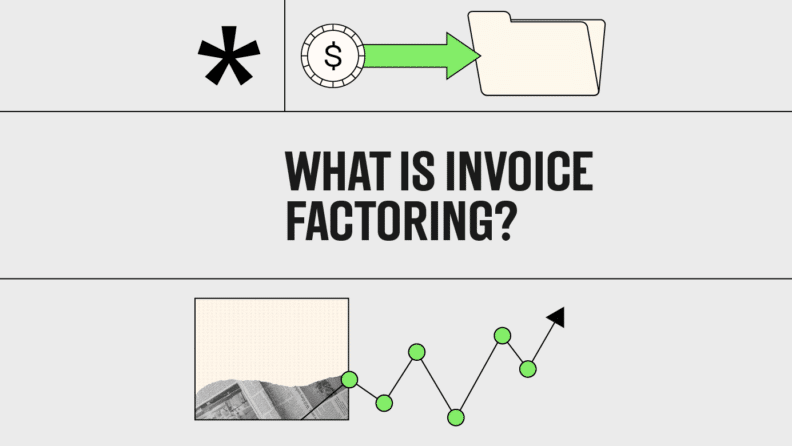Maintaining a positive cash flow while pouring money into operating expenses to build revenue can be difficult; long customer payment terms can stretch accounts receivable to the breaking point, putting your company at risk, even when your revenues look great.
However, there is a cash flow solution that’s often overlooked: invoice factoring. And this isn’t a small, upstart strategy, either; the factoring market is expected to reach $4.8 billion in 2027.
I'll tell you everything you need to know about invoice factoring and how to get started.
What is Invoice Factoring?
Invoice factoring is a form of financing that allows you to get immediate cash for your outstanding invoices, in exchange for a percentage of their value (known as the factor fee). Depending on the factoring company, you can get funding for your invoices on the same day you apply (instead of waiting for weeks on an invoice due date).
Invoice factoring provides an advance on your account receivables, for a fee. Aside from being a cheaper source of short-term cash than many other debt and equity options, it’s also used by tech companies that want to hedge their credit control function against bad debt.
Invoice Factoring Example
Invoice factoring is a simple process that works as follows:
- You have a $200,000 invoice that is due in 60 or 90 days.
- You factor your invoice to a factoring company.
- The factoring company gives you $190,000 or more upfront.
- The factoring company collects the full $200,000 from your client when the invoice is due.
- You pay the factoring company a fee, usually around 2-5% of the invoice amount.
Even with the best accounts receivable automation software, cash flow can be difficult to track and manage; therefore, invoice factoring can be a good option for businesses that need cash flow quickly. It can also help businesses improve their credit score. However, it is important to compare the fees of different factoring companies before choosing one.
How Does Invoice Factoring Work?
First, you find a factor. Then, you get money. Simple, right?
The factoring company that buys your unpaid invoice is known as the factor; they give you a cash advance on your invoice depending on the total value, which they recover when your client (hopefully) pays on the invoice due date. There are minor differences for small businesses looking to factor their invoices but, for the most, part, it works the same.
Invoice factoring falls into one of two categories, classified according to the level of risk associated with the transaction.
Non-Recourse Invoice Factoring
In this type of factoring, the factor bears the whole risk for the invoice. You get your cash advance and don’t have to worry about unpaid invoices or late payments. The factor is wholly responsible for recovering the invoice funds in whatever way possible.
As the factor bears the entirety of the risk, you can expect cash advances to be lower and factor fees to be higher, relative to recourse factoring.
Recourse Invoice Factoring
You guessed it - you’re on the hook for unpaid invoices.
As opposed to non-recourse invoice factoring, your company is responsible for ensuring the clients pay the invoices when due. Failure to pay from your customers' end means you have to buy back the unpaid invoice from the factor. If your customers have good credit, it’s ideal to use this model, as you’re typically going to get better rates and larger cash advances from factors for it.
Invoice Factoring vs. Invoice Financing
Invoice financing is a type of funding in which unpaid invoices are used as collateral for a loan with interest. For example, you could receive a $100,000 loan, using an invoice of the same value as collateral. Just like most other forms of debt, you’ll make interest payments at regular intervals, with a mutually agreed-upon interest rate.
This is different from invoice factoring, in which the invoices are sold to the factor with no loans or interest; instead, the factor earns money through a percentage service fee, deducted from the invoice.
Who is Invoice Factoring Best for?
Invoice factoring usually offers the most benefits for B2B tech firms with recurring clients and invoices ranging from $5,000 - $250,000. It provides flexible financing based on sales, not business credit scores.
Overall, B2B SaaS/tech firms that invoice recurring clients, have variable cash flow needs, and are in high growth mode stand to benefit most from unlocking the cash trapped in their unpaid sales invoices.
However, other tech companies that stand to benefit from invoice factoring include:
- Early-stage revenue-positive start-ups: Factoring provides flexible financing for early-stage startups to fund their growth before qualifying for bank loans or VC funding based on assets and credit. Had I known about invoice factoring back when I ran an investor relations agency, I definitely would’ve factored my invoices.
- Companies with long sales cycles: It can take months for some companies to close enterprise deals and, shocker, expenses don’t wait for the ink to dry. Factoring provides immediate cash between sales cycles to cover immediate business expenditures.
- Businesses selling to other businesses: B2B invoices are ideal for factoring, as consumer invoices tend to be harder to factor due to how small they are (if invoices are issued at all).
- Companies with recurring clients: Businesses with repeat customers (that have a good history of payments) provide a steady stream of invoices to factor.
- Firms waiting for payment of large invoices: Depending on the stage of your company, invoices for $10,000+ can mean huge short-term cash flow gaps. Factoring unlocks that cash.
- Software firms launching new products: Extra funding from factoring helps cover expenses and debt obligations during new product launches.
- Businesses undergoing rapid expansion: Factoring fuels growth by covering costs of new office space, equipment, etc., and helps the business to daily scale.
How Much Does Invoice Factoring Cost?
Invoice factoring fees typically range from 1-5% of the invoices’ face value.
Other charges may apply, depending on the factoring company. These can include:
- Initial fee (or approval fee): a one-time payment made before an invoice is factored. The amount of this fee varies by factoring company.
- Outstanding fee: an amount you pay if your customers do not pay their invoices on time.
- Wire transfer fees: some factors charge for this, while others incur this on their own.
- Additional charges for renewing the invoice factoring contract.
- Account setup and management fees.
Be sure to get an accurate breakdown of the costs involved before signing an agreement with a factoring company to avoid overpaying due to fine print.
It’s important to note that the average cost of factoring for a tech business is variable, depending on situational elements such as:
- Account Receivables amount: Factor fees are usually lower for large invoices.
- Quality of customers: The credit quality of your customers can also determine the cost of your factoring; it costs more to get payment from customers with bad credit.
Advantages Of Factoring
Invoice factoring is a good funding option for tech companies that are trying to scale for the following reasons:
Immediate Access to Cash
Invoice factoring is one of the best ways to turn A/R into cash as soon as possible. As you can easily access up to 90% of the invoice value whenever you need funding, it becomes a lot more manageable to operate your company without debt or equity financing.
Predictable Cash Flow
With invoice factoring, it's easier to generate income consistently as there's no limit to the number of invoices you can factor. Factoring a certain number of invoices helps to forecast cash flow for expenses, provide funds to make debt payments, and make accurate strategic financial decisions for your company.
Flexibility
Having access to funds on your own schedule allows your company to be more flexible, as you can make last-minute financial adjustments as needed - as you know, last-minute adjustments are unfortunately all too common and all too necessary. There’s also no debt obligation, as most factors do not require monthly minimums or long-term contracts.
Disadvantages of Factoring
Factoring can offer big financial benefits; however, there are some key factors to consider before deciding to factor your invoices. These include:
Cost of Factoring
The cost of invoice factoring, which is the fee paid for the factoring, varies from factor to factor. Factoring fees have a low debt leveraging ability and are usually higher than bank loan rates, which can reduce your company's overall profit margin. The fees may not appear huge at first, but when you factor invoices over time, your loss compounds and you can lose a significant amount of money that could have been reinvested in the business.
Compounded Cash Issues
With recourse factoring, you are responsible for repaying any uncollected invoices if your clients do not pay. This could lead to the need for emergency funding, which could strain your company's finances and further exacerbate cash flow issues. Additionally, your company may not be able to afford the long-term consequences of the fees, which could further compound cash flow issues that were initially alleviated by invoice factoring.
Company Reputation
Factoring can hurt a company’s reputation, as some investors may not like the involvement of a third party in the company's finances - which could be interpreted as an inability to properly forecast cash flows. This could lead to them being unwilling to invest in your company. Customers who pay the factoring company directly may also be uncomfortable with the party's involvement.
What to Look For in a Factoring Company
Before choosing a factoring company, you have to ensure it's the best fit for your company and company. To help you make this decision, I’ve highlighted some key factors below, which ought to help you streamline the evaluation process.
- Industry experience with Tech or SaaS clients: Would you rather see a cardiologist or an orthopedist when you have a heart problem? I’m assuming you chose the former, as a cardiologist is better trained and has the necessary experience to provide the best medical solution for the situation. For the same reason, it’s beneficial to allow factoring companies that have experience with SaaS to handle your factoring operations. They have the technical know-how to provide tailor-fit solutions for your company.
- Quick approval and funding turnaround time: It’s also in your company’s best interest to work with factoring companies that have a simple and straightforward process for approval and funding. You don’t want to work with a company that has a difficult process and a long turnaround time, as further cash delays will only worsen a company’s financial health. Ask potential factors to outline their process for you and use this in your evaluation.
- Competitive rates with no hidden fees: An invoice company should be transparent with their fees and overall cost. Ensure the rates are competitive within your niche, so as to get the best value for your invoices.
Decide Using All the Factors
Take a comprehensive look at your company situation, the available options, and what you stand to gain.
Invoice factoring frees up cash flow, allowing your company to continue growing without the worry of payment delays. With the right factoring partner, you can accelerate your company's growth. So, what are you waiting for? Subscribe to The CFO Club’s newsletter to stay up-to-date on the latest financing options and trends that your company needs to be aware of in order to grow.



